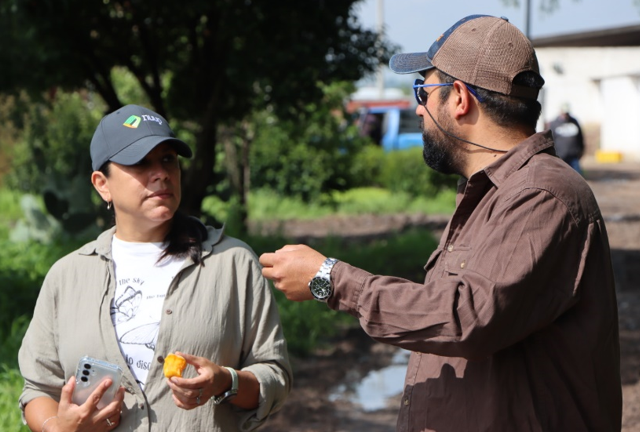We live on a planet covered in water. However, that image is deeply misleading.
Of the total water on Earth, about 97% is salt water, and nearly another 2% is trapped in glaciers and polar ice caps. This leaves less than 1% of freshwater available to supply more than eight billion people, sustain food production, cities, industry, and ecosystems.
That margin was already extremely limited. Today, it is under increasing pressure due to rising demand, watershed degradation, and the increasingly visible effects of climate change. In many territories, the problem is no longer just about how much water exists, but whether it is possible to access that essential resource in a safe, continuous, and sustainable way.
This context makes water security one of the primary global challenges of the 21st century.
🌍 The water crisis: a global problem with local impacts
The water crisis does not manifest the same way in every territory. In some places, it appears as extreme scarcity; in others, as contamination, supply interruptions, or inequality in access. But in all cases, it has a common denominator: increasing pressure on already fragile water systems.
Population growth, accelerated urbanization, and the intensification of productive uses have steadily increased the demand for water. Added to this is the degradation of watersheds—deforestation, soil loss, overexploitation of aquifers—and the impacts of climate change, which alter precipitation patterns and increase the frequency of droughts and floods.
In this scenario, guaranteeing safe water cannot be limited to simply increasing supply. It requires better management of that scarce 1% available by protecting sources, reducing losses, improving water quality, and strengthening local capacities for long-term sustainable management.
💧 From global diagnosis to territorial action
While the problem is global, solutions are always built at the local level, within the watershed. This is where it is decided how water is captured, distributed, used, and protected. That is why at Agua Segura, we work with a territorial approach, developing projects that combine infrastructure, technology, education, and community work.
🇧🇷 Brazil: access to safe water in contexts of urban vulnerability
In Rio de Janeiro, alongside Microsoft, we developed a project in the Vila Beira Mar community, where access to water was not stably guaranteed. In this context, water insecurity directly impacted the health, education, and quality of life of families.
The project included:
- The installation of 15 community reservoirs.
- The expansion of the distribution network with home connections for 70 families.
- The delivery of 200 family water filters, as well as filters for schools and community centers.
These actions, carried out together with TETO Brasil, improved water availability and quality for more than 3,250 people while strengthening community management of the resource. In territories where every supply interruption has immediate consequences, guaranteeing safe water means reducing health risks and opening opportunities for development.
🇨🇱 Chile: safe water in a context of structural drought
In Chile, the central zone faces structural water scarcity, worsened by more than a decade of prolonged drought. In this context, access to drinking water and the reliability of existing systems become critical challenges, especially in rural communities.
Through Microsoft’s Water Positive program, we developed projects in Colina and Curacaví in collaboration with Rural Drinking Water (APR) cooperatives. The goal was to generate new water sources and improve their quality while strengthening local resource management.
The results include:
- An estimated volumetric benefit of 4,500 m³ of water per year.
- Direct impact on nearly 5,000 people.
- Improvements in 14 schools.
- WASH workshops to promote the safe and responsible use of water in drought contexts.
These projects demonstrate that water security depends not only on infrastructure but also on education, governance, and community participation.
🌎 Latin America: scalable solutions together with GRUNDFOS
A similar approach is applied to the projects we develop with GRUNDFOS in Brazil, Chile, Colombia, Mexico, and Argentina. Since 2020, these water access initiatives have reached more than 50,000 people through the implementation of 830 solutions, including:
- Family filters.
- Community dispensers.
- Rainwater harvesting systems.
- Improvements in storage and distribution.
In these contexts, every liter of safe water available has a direct impact on the health, education, and economic opportunities of communities. The scale of the challenge demands adaptable solutions that are always designed based on local reality.
🔄 Beyond volume: how water security is built
These projects show that the water crisis is not just a matter of global volume. Reducing losses, improving quality, bringing water closer to those who cannot access it, and strengthening local capacities are actions that make a difference when the resource is so limited.
Talking about water security implies:
- Protecting and restoring watersheds.
- Improving efficiency in productive uses.
- Implementing nature-based solutions.
- Committing to long-term investments with measurable impact.
When the available margin is less than 1%, every decision counts. The way we manage water today defines not only current access but the resilience of the water systems that future generations will depend on.
🌱 A shared challenge
Water does not belong to a single organization, sector, or territory. It is a shared, interconnected, and vulnerable resource. Therefore, building sustainable water security requires collaboration between communities, companies, governments, and civil society organizations.
At Agua Segura, we work to ensure that every project contributes to strengthening the entire system, from the watershed to the global stage. Because when it comes to water, sustainability is not an option: it is a condition for the future.


